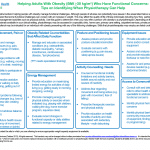Recessions, pandemics, economic downturns: they cut discretionary spending almost overnight and pose existential challenges for health & wellness businesses.
As we explained here, altruistic marketing plus strategic giveaways and discounts can help you survive—and perhaps thrive—when economic times are hard.
Let’s look at how you to troubleshoot altruistic marketing in several common scenarios:
1) Betting on the come: freebies for currently-unemployed people
The idea is that you build future loyalty. We usually see two issues here.
First, the “one and done” scenario. You offer a free massage. It’s nice while they’re receiving it – but 24 hours later they’ve probably forgotten it. Yes, it’s altruistic and a nice gesture – but you probably won’t get any of the near-term and long-term business benefits we listed in the article.
Second, the “overwhelming response” scenario. You offer a really nice freebie. LOTS of people take you up on it, with negative consequences for your business.
It’s much harder to fix this problem once it develops without making people mad, so avoid it by putting boundaries around what you decide to offer, as we described in the article.
2) When potential customers fear losing their jobs
If so, protection features (like the suit rebate mentioned in the Altruistic Marketing article, or Auto Nation’s offer to make car payments) can prompt your customer to go ahead and buy.
3) When potential buyers fear making a substantial long-term commitment
We see this issue most commonly with annual membership plans at health clubs, medical fitness centers, and wellness centers.
You might offer to cover a couple of months of free or heavily discounted membership in the event of job loss followed by a no-fault/no-fee cancellation policy if they still haven’t found a new position within, say, 60 – 120 days.
It can also be an issue for events where advance registration is required, like a conference or multi-day workshop.
In that situation, you might consider some kind of partial or full registration fee or travel rebate for attendees who lose jobs between now and the scheduled event.
4) When people are hesitant to pay upfront for services to be delivered over several months
We see this issue for smaller purchases like punch cards for group fitness and yoga classes or replenishment subscriptions for nutritional supplements and specialty food products.
A rebate in the event of job loss is one approach to restore confidence in your potential buyer. Allowing penalty-free returns (if allowed by public health codes in your state) is another option. You might also consider letting them keep the product, and refunding a pro-rata amount of the purchase price. Require some documentation of the change in their employment status so your generous gesture isn’t abused.




